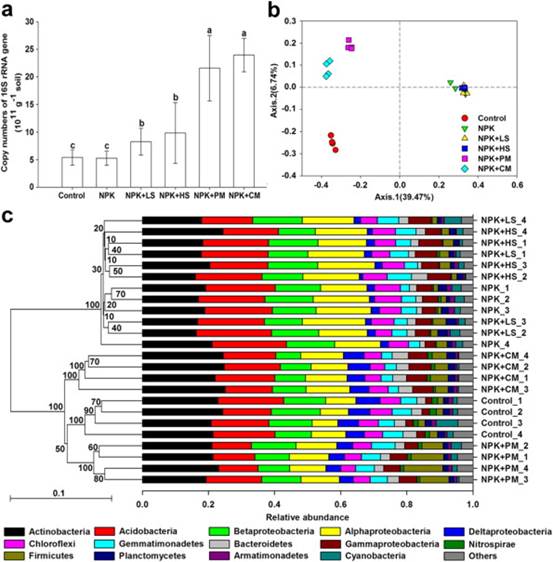揭示土壤微生物多样性维持机制

长期施用化学肥料常常会导致土壤退化,有机肥与化肥的联合施用可以缓解土壤退化,提升土壤生产力,然而其中内在的土壤微生物学机制并不清楚。日前,中科院南京土壤所揭示了土壤微生物多样性的维持机制,相关成果发布在《土壤生物学与土壤生物化学》上。
砂姜黑土主要分布在黄淮海平原南部地区,这里是我国重要的粮食及棉、油、菜等作物产区。土壤所褚海燕课题组以安徽省农业科学研究院砂姜黑土长期施肥试验为研究平台,研究了不同施肥措施对砂姜黑土细菌群落结构与多样性的影响。
科研人员发现,长期单施化肥导致了土壤细菌群落结构的显著改变与多样性的大幅降低;粪肥的添加极大地缓解单施化肥对细菌群落的不利影响,而秸秆的添加对细菌群落的影响较小。进一步研究发现,粪肥主要通过改变土壤环境影响土壤细菌群落,而不是粪肥带入的外源细菌的直接输入。
这些结果表明,有机粪肥与化肥的联合施用,能促进土壤微生物群落结构的稳定与多样性的维持,为保持土壤生物活性、提升土壤生产力奠定了基础。(来源:中国科学报 彭科峰)
Bacterial diversity in soils subjected to long-term chemical fertilization can be more stably maintained with the addition of livestock manure than wheat straw
Abstract Addition of organic matter such as livestock manures and plant residues is a feasible practice to mitigate soil degradation caused by long-term application of chemical fertilizers, and the mitigation is largely mediated though activities of the soil-dwelling microorganisms. However, the roles of different kinds of organic matter in maintaining bacterial community structure have not been assessed in a comparative manner. In this study, 454 pyrosequencing of 16S rRNA gene was employed to compare the bacterial community structure among soils that had been subjected to 30 years of NPK fertilization under six treatment regimes: non-fertilization control, fertilization only, and fertilization combined with the use of pig manure, cow manure or low- and high-level of wheat straws. Consistent with expectation, long-term application of NPK chemical fertilizers caused a significant decrease of bacterial diversity in terms of species richness (i.e. number of unique operational taxonomic units (OTU)), Faith\&\#39\;s index of phylogenetic diversity and Chao 1 index. Incorporation of wheat straw into soil produced little effects on bacterial community, whereas addition of either pig manure or cow manure restored bacterial diversity to levels that are comparable to that of the non-fertilization control. Moreover, bacterial abundance determined by quantitative PCR was positively correlated with the nutritional status of the soil (e.g., nitrate, total nitrogen, total carbon, available phosphorus); however, bacterial diversity was predominantly determined by soil pH. Together, our data implicate the role of livestock manures in preventing the loss of bacterial diversity during long-term chemical fertilization, and highlight pH as the major deterministic factor for soil bacterial community structure.
原文链接:http://ac.els-cdn.com/S0038071715001777/1-s2.0-S0038071715001777-main.pdf?_tid=2cade28c-1e25-11e5-99d1-00000aab0f02&acdnat=1435558251_50fb278ff828a0018f315d556695ff58

